

Module 1: Basic Operations
Basic Operations
To learn how to navigate in the ESC space, you need to learn about celestial bodies and their interactivity: Who is who? Where do the space creatures share and store information? Which documents are more important? And where to ask questions when you’re lost in space?
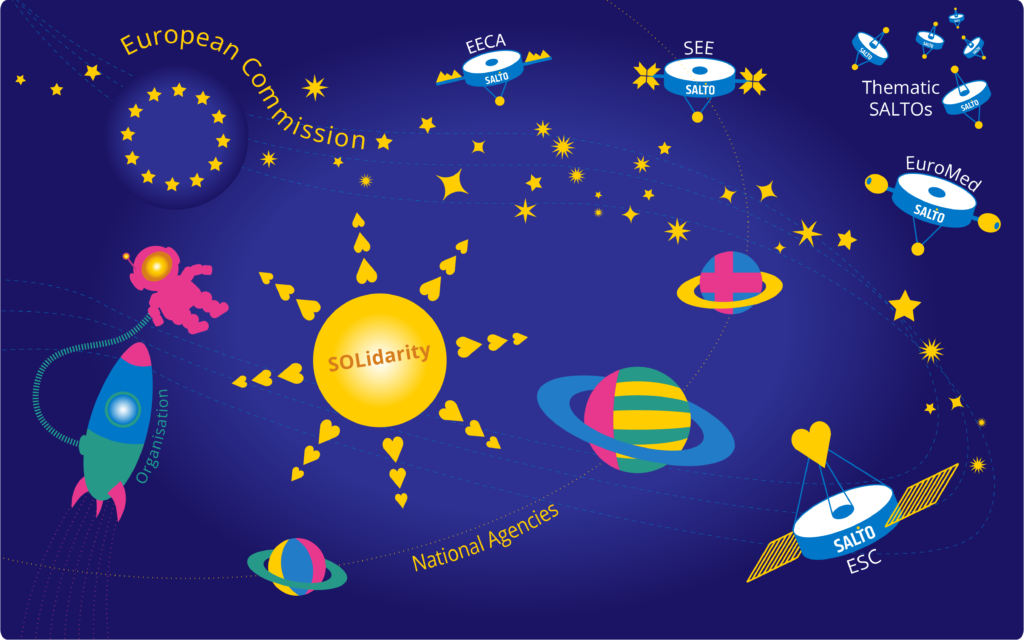
ESC universe. Illustration: Laura Mellanen | Vaste
The European Commission – a constellation that guides your way
The European Commission (EC) has global responsibility for the operation of the European Solidarity Corps. It manages the budget, general implementation and oversees National Agencies and SALTO Resource Centres.
The Commission’s Erasmus+ and European Solidarity Corps programmes are under the responsibility of the Directorate General for Education and Culture (DG EAC). The EC also has an Education and Culture Executive Agency (EACEA) which is responsible for implementing the centralised actions of the European Solidarity Corps.
In addition, the Commission is responsible for all technical applications and tools used to administer the budget, grant applications and projects. It also provides manuals and training on the use of the administrative tools.
The most important steering documents
There are three major guides that every NA officer needs to navigate the ESC universe. They are long, detailed, and written in complex administrative language. But there is no way around it: these are documents you must read, understand, and be prepared to use frequently.
Luckily enough, the guides also provide answers to most of your questions.
1. European Solidarity Corps Guide
The European Solidarity Corps Guide, also known as the Call for proposals, ESC Guide or Programme Guide, is a guidebook for anyone wishing to submit a Quality Label or a grant application. In addition to the rules and conditions for receiving a grant, it explains the political context, the aims and objectives of the programme, the types of action, the quality and support measures, and the application and grant procedure.
The ESC Guide is updated every year. For a specific project, it is always the guide of the granting year that applies.
Pro tip: Be sure to add the ESC Guides to your bookmarks or always have them easily available in some other way.
2. Platform for Applicants and Participants in the Programmes
The Erasmus+ and European Solidarity Corps platform is the single-entry point to all IT systems provided by the Commission. You need an EU Login with NA/SALTO profile to access the platform and IT systems.
3. ESC Guide for Experts on Quality Assessment
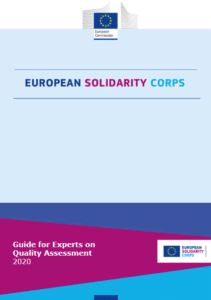 Managing and distributing programme funds in a standardised and transparent manner is the primary task of National Agencies.
Managing and distributing programme funds in a standardised and transparent manner is the primary task of National Agencies.
To help accomplish this task, the EC has published the ESC Guide for Experts on Quality Assessment. The Guide for Experts provides information on the role and appointment of experts, the principles of assessment, the process, and the award criteria.
It also provides instructions to NA staff on how to prepare the selection grounds and contains a template for the Declaration on the prevention of conflicts of interest and disclosure of information .
If you are assessing proposals and/or in charge of organising the selection rounds, this guide is your best friend.
4. Guide for National Agencies implementing the Erasmus+ and European Solidarity Corps Programmes
The National Agencies Guide, or just “NA Guide” among friends, is an internal document detailing how National Agencies should implement the programme in their respective countries.
The NA Guide’s main purpose is to ensure good governance and ethical management of the EU funds entrusted to National Agencies. The Guide sets out the minimum requirements for National Agencies in all aspects of programme implementation: from fund management to accounting, communication, monitoring grant beneficiaries, dealing with irregularities and fraud, processing personal data, managing NET activities, and much more.
The National Agencies Guide also gives you an overview of the IT systems provided by the Commission.
Reading the National Agencies Guide will save you a lot of headaches. Although it is many pages, but it will also give you the much-needed self-confidence everyone misses early on. So we really suggest that you read it!
The Guide for National Agencies is refreshed by the European Commission every year. The document can be reached under the NAConnECtWiki, which is a restricted space to Commission and NA colleagues.
Once you enter the NAConnECtWiki, follow: Pages > Programme Documentation > NA Guidance
For more details on how to access NAConnECtWiki and what else you can find there, please continue reading below.
Where to find the Commission’s manuals, guidelines, instructions, and IT Tools?
All the manuals provided by the Commission are available at the NAConnECt Wiki. It is a restricted space to Commission and NA colleagues, which is accessible with your EU Login AND after authorization through the person responsible for handling such IT right within your NA. If you are not sure whether you have such right, the best is to contact your IT department.
How to communicate with the European Commission?
The EC has created internal communication and collaboration tools to facilitate cooperation among National Agencies and SALTOs. There are also channels to ask questions and inform the Commission of issues in the IT systems.
The NAconnECt platform
The NAconnECt is designed for structured communication and collaboration. This is where all the information and documentation about the management and implementation of programmes is stored. It integrates different tools to serve specific communication needs:
- NAconnECt Wiki: repository space for Commission’s documents and information addressed to National Agencies,
- NAconnECt IT Doc Wiki: space for IT systems’ user guides and processes.
MS Teams hosted by the EC
- NAconnECt Teams: social network for exchanges of information, discussion and consultation between NAs, SALTOs and the EC. It has several channels for Solidarity Corps: for example, Solidarity Projects, Quality Label, and Communication.
Issue Management Tool (IMT)
- NACO (National Agency Content Helpdesk): the official Q&A channel on the programmes’ content,
- NAIT (National Agency IT Helpdesk): the official Q&A channel for IT related issues. You can use this tool to report issues or submit questions,
- FAQ (Frequently Asked Questions): displays the FAQs related to the content of the programmes.
When asked what ESC officers wish they had known when they first started their job, most answers were linked to the technical implementation of the programme: “I wish I had known the process”, “I wish I had more guidance on the programme tools, their role and connectivity”, or “I wish I had known the budget allocation rules”.
These topics are indeed of utmost importance. Learning the processes, becoming familiar with the tools, and memorising the programme rules will take a lot of your time and attention early on.
We recommend that you make yourself a scheduled study plan to read the relevant parts of the three most important guidebooks. Highlight the parts that need to be clarified and discuss them with your colleagues. Building a common understanding is crucial.
Don’t worry if you don’t remember everything– no one does! Having to rely on these guides again and again is an integral part the ESC officer’s job, especially when details change every year, and you have projects funded under different years and rules. Accept this and have the Commission guides stand in the place of honour in your professional (electronic) library.
The SALTO Resource Centres – satellites that help you navigate on specific areas
SALTO stands for Support, Advanced Learning and Training Opportunities. It is a network of resource centres working on European priority areas. There are SALTOs which concentrate their work exclusively on the youth field (SALTO-YOUTH), several SALTOs are cross-sectoral and some operate in education and training.
The SALTO-YOUTH network’s mission is to improve the quality and impact of EU youth programmes and to support and develop European youth work.
- SALTO-YOUTH Resource Centres help build the capacity of organisations and provide tools to facilitate cooperation in the context of the Erasmus+ and European Solidarity Corps programmes and beyond. They provide non-formal learning resources for youth workers and youth leaders;
- organise training and contact-making activities for organisations and National Agencies.
SALTO-YOUTH Resource Centres develop and maintain the following tools:
- European Training Calendar: trainings and seminars organised by SALTOs, National Agencies and NGOs
- Toolbox for Training: hundreds of tools and activity ideas for youth work
- Otlas Partner Finding Tool: thousands of youth organisations and projects looking for partners
- Trainers Online for Youth: a directory of over 500 trainers who can deliver international training activities.
Although European Solidarity Corps programme targets the youth, being familiar with all the SALTOs provide basis for cross-sectoral cooperation, therefore it is worthwhile to know about them.
SALTOS are grouped into two categories: regional and thematic. You can find more information on both further below.
But first let us present you our SALTO, the SALTO European Solidarity Corps.
SALTO European Solidarity Corps Resource Centre – that’s us!
The European Solidarity Corps has its very own SALTO Resource Centre – how cool is that?!! We, SALTO European Solidarity Corps, are located in Vienna, Austria.
Watch the video to see, how we support you and your National Agency/SALTO.
Our strategic aim is to have an impact on five areas:
- Shaping Solidarity to establish a European discourse on solidarity and strengthen the recognition of its value.
- Strengthening European Volunteering in order to improve the conditions for volunteering across Europe and partner regions and to raise awareness of the ESC programme and its impact.
- Embedding Solidarity to promote the value of solidarity in all actions and activities of the EU youth programmes by supporting their synergies.
- Supporting Quality Implementation to effectively support NAs and regional SALTOs in the implementation to maximise the impact of the ESC.
- Supporting the Creation of a Community of Practice to build a thriving European community of practice around ESC, including organisations, mentors, trainers, municipalities, and solidarity project organisers.
Solidarity Corps Staff in MS Team
In our MS Teams, we host a team called Solidarity Corps Staff. This Team and its channels are an open forum for all discussions regarding the European Solidarity Corps. Here we share the tools and resources for internal use.
We invite you to take part in the discussion, comment and contribute!
Thematic SALTO Resource Centres
The thematic (or priority) SALTO Resource Centers support the transversal priorities of the Erasmus+ programme or contribute to developing the capacities of National Agencies and organisations working with Erasmus+.
The thematic areas are in line with the Programme priorities and include:
- Inclusion and diversity (in Belgium, Flanders for Youth and in Croatia for E&T )
- Green transition and sustainable development (in France – for all sectors)
- Digital transformation (in Finland – for all sectors)
- Participation and information (in Estonia – for all sectors)
- Youth-related training and cooperation (in Germany)
- Education and training related training and cooperation (in Hungary)
Regional SALTO Resource Centres
Regional SALTOs are responsible for the Programmes in the neighboring partner countries. They play an important role in the implementation of the European Solidarity Corps, as they are responsible for the Quality Label process and the Training and Evaluation Cycle in such countries.
Regional SALTO’s role is similar to that of National Agencies (with the exception of not granting projects). They promote quality in projects and empower organisations by providing support and developing training, tools, and resources.
They also have knowledge and experience on the organisations in neighbouring countries as well as the culture and policy of each country. This can be helpful when you need to advise organisations that cooperate in neighbouring countries.
The SALTOs operate in 3 regions:
- Eastern Europe & Caucasus in Eastern Partnership countries and Russia (located in Poland),
- EuroMed in Southern Mediterranean countries (located in France),
- South-East Europe in Western Balkans (located in Slovenia).
All in all, SALTOs are like satellites circulating in and around the ESC universe. They support you by helping you navigate their area of expertise.
To stay up to date on SALTO Resource Centres’ activities, it is a good idea to subscribe to their newsletter(s) and follow their social media channels. You can also contact them directly and ask for support.
Cooperation with other NAs and SALTOs
You probably know by now what National Agencies do, right? What is equally important to understand is that, despite the common responsibilities, National Agencies are like different planets. They are hosted under various types of organisations and work is organised differently. Larger countries might have an ESC team where each officer only handles certain aspects of the programme, whereas in small countries, the ESC officer could have a bunch of other responsibilities in addition to the ESC.
However, even if your job description is unique and your planet is one of a kind, other ESC officers, along with the SALTO staff, are your best source of information and a gateway to broader an understanding of the programme. This is why it is important for you to meet with others regularly and build networks. In fact, having a community of like-minded souls consisting of National Agency and SALTO staff is one of the highlights of working in an NA!
Often, countries in the same geographic area have a lot in common, because societies share similarities. Linguistic kinship can also unite and ease cooperation. If you are starting something new, it is always worthwhile to check if another NA has already done what you plan to do. Knowing how others have taken on your new challenge could save you a lot of time and effort.
Meeting and greeting the European colleagues
As one ESC officer pointed out in our survey, one thing they wished for when starting at the NA was knowing “experienced programme officers who could share their tips and tricks to help the newbies”.
These heavenly creatures with tips and tricks are out there, and there are live events and online forums where you can meet them.
Annual National Agency Staff Meetings
All ESC officers meet once a year as part of an ESC staff meeting organised by the SALTO European Solidarity Corps, the European Commission, and the rotating host NA. The annual staff meeting is common to all actions: volunteering, solidarity projects and humanitarian aid volunteering.
The aim of the staff meeting is to keep everyone up to date on the programme and to keep an open dialogue between the Commission and the other bodies implementing the programme. It is the best occasion to meet your European colleagues and share concerns, ideas, good practices and failures.
In addition to the common staff meeting, the solidarity project officers hold a separate residential meeting every 18 months: Colleague support group for Solidarity Project officers.
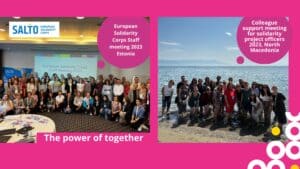
Online discussion forums
There are also several online platforms where you can ask questions and share with your colleagues.
- Solidarity Corps Staff Team under the SALTO ESC’s MS Teams: official information exchange network among SALTO ESC and the ESC officers in NAs and Regional SALTOs;
- Solidarity Project officers’ informal exchange: the group meets online to share on topics they find important at the time. The group is currently coordinated by Rita Stadtfeld (stadtfeld@jfemail.de);
- ESC/EVS Officers’ Facebook group: the oldest and most informal group where you can ask the questions you wouldn’t dare ask elsewhere, throw an inside joke or just let off some steam. (Access by invitation.)
You can find your European colleagues’ contact information in our Solidarity Corps Staff Team in MS Teams. Please make sure to fill in your own information and also check that all the information about your country is up to date!
Beneficiary organisations and young people
The ESC universe spreads beyond the European Commission and NA & SALTO colleagues. Youth and organisations benefiting from the European Solidarity Corps, are an integral part of the ESC community of practice.
Organisations are like spaceships that carry young astronauts in their quest for solidarity.
Organisations become ESC beneficiaries through the Quality Labelling process. What makes the ESC programme special, is that any type of organisation (public or private entity, not-for-profit or for-profit, local, regional, national or international) can obtain a Quality Label. This expands the potential ESC community of practice far beyond the youth sphere, to wherever solidarity exists.
In early 2023, over 5,000 organisations hold a Quality Label in Europe and neighbouring partner countries.
Young people, the brave astronauts eager to discover the unknown lands of solidarity, are at the heart of the European Solidarity Corps. They are the ones who go all out in solidarity projects or in individual, team, or humanitarian aid volunteering.
In 2023-2024, more than 25 000 young people had the opportunity to volunteer within the ESC. Nearly half of them were young people with fewer opportunities. The number of volunteers taking part in the Programme is growing from year to year since 2021.
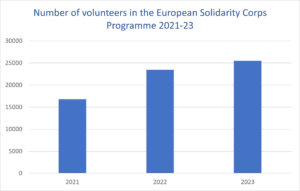
Moreover, in 2022-2023, over 3,000 solidarity projects received funding from the ESC. Both the number of solidarity projects submitted and awarded for funding grew steadily in the past years.
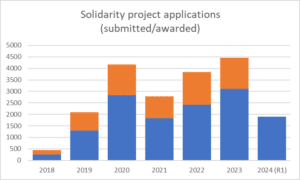
European Youth Portal and the European Solidarity Corps Portal
The European Youth Portal (EYP) is a website where the European Commission communicates EU youth policy on a practical level. It is mainly intended for young people, but also for other stakeholders working in the youth sector.
The European Youth Portal offers European and country level information on opportunities and initiatives for young people living, studying and working in Europe. It is also where the Commission informs young people and organisations on the European Solidarity Corps.
European Solidarity Corps Portal
The European Solidarity Corps Portal is embedded in the EYP. It is the place where young people register to be part of the corps, look for open volunteering projects or organisations, and get general online training. The organisations can open calls for volunteers and reach out to registered young people.
The databases hosted in the ESC Portal are often useful for ESC officers as well. With just a few clicks, you can easily check the number of organisations holding QL, the number of open volunteering positions or access information on granted solidarity projects.
Continue navigating the ESC Space >>
Can you feel the burning of SOLidarity?